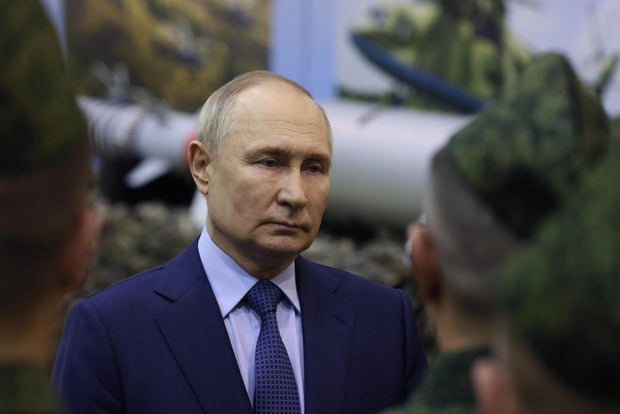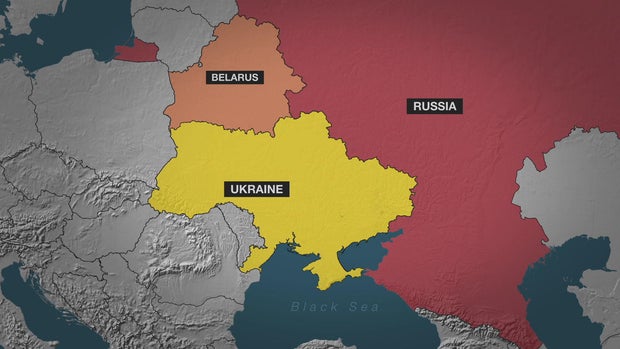Russia said on Monday it plans to hold exercises simulating the battlefield use of nuclear weapons, also known as tactical nuclear weapons, amid rising tension following comments by senior Western officials about the possibility of deeper involvement in the war in Ukraine.
The announcement came the day before Russian President Vladimir Putin’s inauguration for a fifth term in office and several days before Moscow celebrated Victory Day, Russia’s most important secular holiday marking the defeat of Nazi Germany in World War II.
The exercises come in response to “provocative statements and threats by certain Western authorities towards the Russian Federation,” the Defense Ministry said in a statement.
MIKHAIL METZEL/POOL/AFP/Getty
It was the first time Russia had publicly announced exercises involving tactical nuclear weapons, although its strategic nuclear forces regularly carry out exercises. Tactical nuclear weapons include aerial bombs, warheads for short-range missiles, and artillery shells and are intended for battlefield use. They are less powerful than the huge warheads that arm intercontinental ballistic missiles, designed to destroy entire cities.
The Russian announcement was a warning to Ukraine’s Western allies about becoming more deeply involved in the two-year-old war. Ukraine’s President Volodymyr Zelenskyy and some of his Western partners have warned that if Russia is not stopped, the conflict could extend beyond Ukraine in a war between NATO and Russia.
French President Emmanuel Macron repeated last week that does not exclude sending troops to Ukraine, and UK Foreign Secretary David Cameron said Kiev’s forces will be able to use long-range British weapons to attack targets inside Russia. Some other NATO countries that supply weapons to Kiev have refused this possibility.
The Kremlin called these comments dangerous, increasing tension between Russia and NATO. The war has already put significant strain on relations between Moscow and the West.
Kremlin spokesman Dmitry Peskov said on Monday that Macron’s recent statement and other remarks by British and US officials prompted the nuclear exercises.
“It’s a new round of escalation,” Peskov said, referring to what the Kremlin considered provocative statements. “It is unprecedented and requires special attention and special measures.”
Dmitry Medvedev, deputy head of Russia’s Security Council, which Putin chairs, said Macron and Cameron’s comments risk pushing the nuclear-armed world into a “global catastrophe.”
It was not the first time that Europe’s military support for Ukraine provoked nuclear saber-rattling. In March 2023, following the United Kingdom’s decision to supply Ukraine with armor-piercing projectiles containing depleted uranium, Putin said he would deploy tactical weapons nuclear weapons on the territory of Belarus, neighboring Ukraine. The president of that country, a close ally of Putin, then stated in June – without providing evidence – that Russian nuclear weapons “three times more powerful” than those used against Japan by the USA in the Second World War had been installed in Belarus.
CBS News
The Russian Defense Ministry said the exercise announced on Monday was aimed at “increasing the readiness of non-strategic nuclear forces to carry out combat tasks” and would be carried out on Putin’s orders. The maneuvers would involve missile units from the Southern Military District, which borders Ukraine, along with the Air Force and Navy, he said.
The Russian announcement elicited little reaction in Ukraine, where Military Intelligence agency spokesman Andrii Yusov said on national television: “Nuclear blackmail is a regular practice of the Putin regime; it is not important news.”
Western authorities blamed Russia for threatening a wider war through provocative acts. NATO countries said last week that they were deeply concerned about a campaign of hybrid activities on military alliance soilaccusing Moscow of being behind them and saying they pose a security threat.
Peskov dismissed these allegations as “new unfounded accusations directed at our country.”
Germany said on Monday it had recalled its ambassador to Russia for a week of consultations in Berlin following an alleged computer hack into Chancellor Olaf Scholz’s party.
Meanwhile, Ukrainian drones struck two vehicles on Monday in Russia’s Belgorod region, killing six people and injuring 35 others, including two children, local authorities said. The area has been hit by Kiev forces in recent months.
One of the vehicles was a minibus carrying agricultural workers, Belgorod Governor Vyacheslav Gladkov said.
The report could not be independently confirmed.
Although Ukraine’s army is largely trapped on the 600-mile front line due to troop and ammunition shortages after more than two years of fighting, it has used its long-range firepower to hit targets deep inside Russia.
In what has largely been a war of attrition, Russia also relies heavily on long-range missiles, artillery and drones to damage Ukraine.
Kremlin forces continued to bomb Ukraine’s power grid, with a nighttime attack by Russian drones targeting energy infrastructure in the Sumy region of northern Ukraine. Several cities and towns in the region, including Sumy, lost power, regional authorities said.
Russia attacked Ukrainian targets with 13 Shahed drones overnight, 12 of which were intercepted in the Sumy region, the Ukrainian Air Force said.























